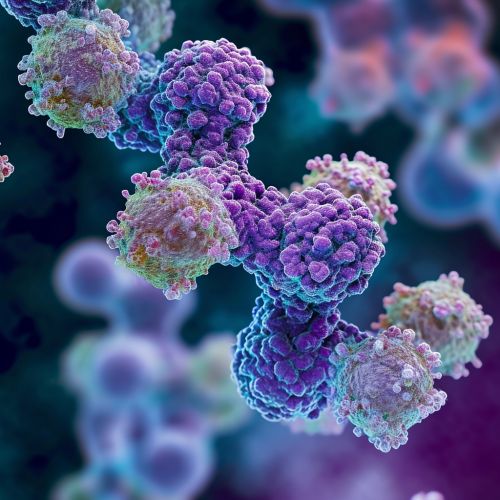Interferon therapy
Introduction
Interferon therapy refers to the use of interferons, a group of signaling proteins produced and released by host cells in response to the presence of several pathogens, as a therapeutic agent in the treatment of various diseases. Interferons are named for their ability to "interfere" with viral replication and play a crucial role in the immune response.
Types of Interferons
Interferons are broadly classified into three types: Type I, Type II, and Type III.
Type I Interferons
Type I interferons include Interferon-alpha (IFN-α) and Interferon-beta (IFN-β). They are primarily involved in the innate immune response against viral infections.
Type II Interferons
The only Type II interferon is Interferon-gamma (IFN-γ), which is involved in the adaptive immune response and plays a significant role in fighting bacterial and parasitic infections.
Type III Interferons
Type III interferons, also known as Interferon-lambda (IFN-λ), are involved in the immune response at epithelial surfaces, particularly in the respiratory and gastrointestinal tracts.
Mechanism of Action
Interferons exert their effects by binding to specific receptors on the surface of cells, triggering a cascade of intracellular signals that lead to the expression of numerous interferon-stimulated genes (ISGs). These genes encode proteins that have antiviral, antiproliferative, and immunomodulatory effects.
Interferon Therapy in Diseases
Interferon therapy has been used in the treatment of a variety of diseases, including viral infections, cancers, and autoimmune disorders.
Viral Infections
Interferon therapy, particularly with IFN-α, has been used in the treatment of chronic hepatitis B and hepatitis C infections. It is also used in the treatment of certain other viral infections, such as human papillomavirus (HPV) and Kaposi's sarcoma-associated herpesvirus (KSHV).
Cancers
Interferons have antiproliferative effects and can inhibit the growth of cancer cells. They have been used in the treatment of various cancers, including melanoma, renal cell carcinoma, and leukemia.
Autoimmune Disorders
Interferon therapy, particularly with IFN-β, has been used in the treatment of multiple sclerosis, an autoimmune disorder affecting the central nervous system.
Side Effects and Risks
Interferon therapy is associated with a range of side effects, including flu-like symptoms, depression, and cytopenias. Long-term use can lead to more serious side effects, such as liver damage and autoimmune disorders.
Future Directions
Research is ongoing to develop new interferon-based therapies with improved efficacy and reduced side effects. This includes the development of pegylated interferons and the exploration of combination therapies with other antiviral or anticancer agents.
See Also


